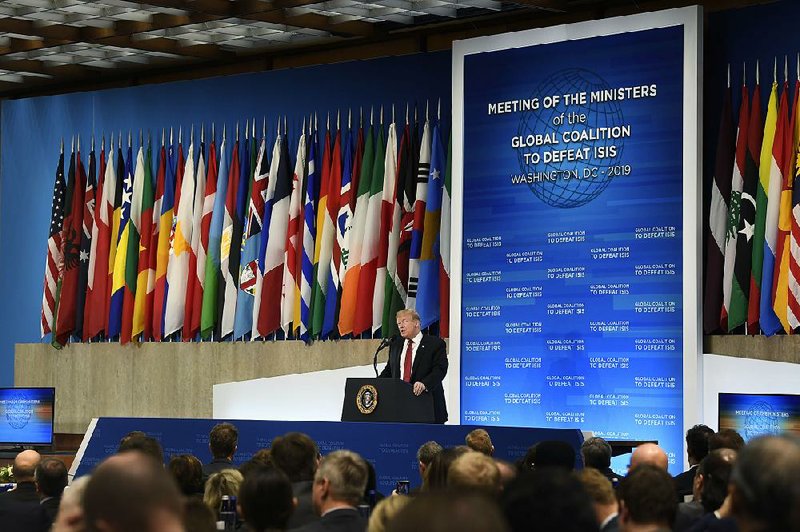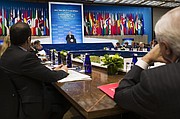WASHINGTON -- President Donald Trump predicted Wednesday that the Islamic State militant group will have lost by next week all the territory it once controlled in Iraq and Syria. He said the U.S. will not relent in fighting remnants of the extremist organization despite his decision to withdraw U.S. troops from Syria over the objections of some of his most senior national security advisers.
The president told representatives of a 79-member, U.S.-led coalition fighting the Islamic State that the militants held a tiny percentage of the vast territory they once claimed as their "caliphate."
"It should be formally announced sometime, probably next week, that we will have 100 percent of the caliphate," Trump said.
U.S. officials have said in recent weeks that the Islamic State has lost 99.5 percent of its territory and is holding on to fewer than 2 square miles in Syria in the villages of the Middle Euphrates River Valley, where the bulk of the fighters are concentrated.
But there are fears the impending U.S. pullout will imperil those gains. Trump told coalition members meeting at the State Department that while "remnants" of the group were still dangerous, he was determined to bring U.S. troops home. He called on coalition members to step up and do their "fair share" in the fight against terrorism.
Even as Trump and Secretary of State Mike Pompeo defended the withdrawal decision, which shocked U.S. allies and led to the resignations of Defense Secretary James Mattis and the U.S. envoy to the anti-Islamic State coalition, Brett McGurk, some military leaders renewed their concerns.
While the withdrawal would fulfill a Trump goal, top military officials have pushed back for months, arguing the Islamic State remains a threat and could regroup. U.S. policy had been to keep troops in place until the extremists are completely eradicated.
Pompeo told the coalition that the planned withdrawal "is not a change in the mission" but a change in tactics against a group that should still be considered a menace.
"In this new era, local law enforcement and information sharing will be crucial, and our fight will not necessarily always be military-led," he said. Trump's announcement "is not the end of America's fight. The fight is one that we will continue to wage alongside of you."
Yet senior military officials acknowledged to Congress on Wednesday that the pullout would complicate their efforts.
Owen West, the assistant secretary of defense for special operations, told the House Armed Services Committee that he shared Mattis' objections. West answered, "No, sir," when asked by a lawmaker whether he thought Mattis was wrong to disagree with the withdrawal.
At the same hearing, Maj. Gen. James Hecker, vice director of operations for the Joint Chiefs of Staff, said the withdrawal means "it is going to be difficult to keep up the pressure" on the Islamic State. "There will be a decrease in the amount of pressure that we will be able to apply," he said.
"The concern is if we move our forces out of Syria that that may take some pressure off of the ISIS forces in Syria," Hecker said, using an acronym for the Islamic State. "So our mission is to try to figure out how we can continue to keep the pressure on in Syria without any boots on the ground."
Separately, a new U.N. report that circulated Wednesday said that international terrorist groups carried out more attacks in Iraq and Syria in the last six months of 2018 than in any other country and that Islamic State extremists were primarily to blame.
U.N. experts said in the report to the Security Council that the Islamic State and its affiliates "continue to pose the main and best-resourced international terrorist threat, while al-Qaida remains resilient and active in many regions and retains the ambition to project itself more internationally."
Even though the Islamic State's territorial losses in Iraq and Syria "have forced the group to abandon notions of controlling a geographical so-called 'caliphate' for the near future," the experts said its leaders continue to advance this aspiration in statements and online propaganda.
The panel of experts said the Islamic State "has not yet been defeated" in Syria.
Islamic State fighters remain under "intense military pressure" in their stronghold in eastern Syria, the experts said, but have "shown a determination to resist and the capability to counter-attack."
U.N. member states, who were not identified, estimate the number of Islamic State militants active in Iraq and Syria at between 14,000 and 18,000, the experts said.
This includes between 3,000 and 4,000 in the only remaining Islamic State-held territory in Syria, in the Middle Euphrates River valley near the Iraqi border, around the town of Hajin, they said.
Information for this article was contributed by Edith M. Lederer of The Associated Press.
A Section on 02/07/2019

